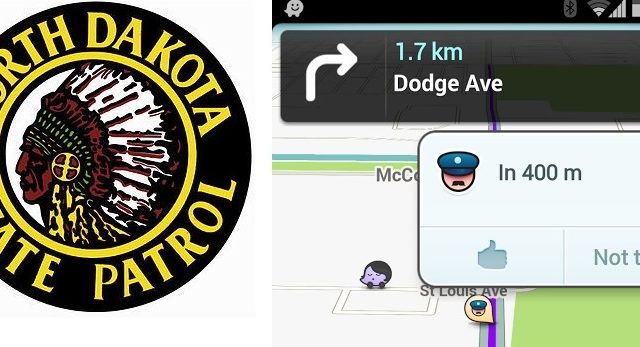North Dakota Highway Patrol Spokesman Says Google-Owned Waze App Helps Criminals

With the Christmas holiday coming up a lot of you will probably be hitting the road to visit friends and family. One tool you might use to help you get to your destination quickly and easily is Waze, a Google-owned GPS app which helps route you around traffic delay, and warns of you of hazards like debris on the road and accidents.
Waze has become so popular in some parts of the country that people living along side-streets near busy roadways are complaining about the Waze effect, or the number of cars routed through their neighborhoods to avoid traffic.
But at least one North Dakota law enforcement officer says the app has another side effect. The app allows you to report the location of police officers on the road, and that helps drug smugglers and human traffickers according to Lt. Tom Iverson of the North Dakota Highway Patrol.
I had Iverson on the Jay Thomas Show last week to talk about that Popular Mechanics article naming North Dakota the best place in the country to speed, but when I mentioned Waze to Iverson (who wasn’t aware of the app previously) he didn’t like what he was hearing.
“That’s fine to do that. We’re not out there making it a game by any means,” he told me, acknowledging that the use of the app was legal. But he also suggested that it helps efforts to stop crimes far more serious than traffic violations.
“You’ve got to also realize that the way we catch drug smugglers, people involved in human trafficking, DUI drivers…the way we catch criminals out on our roadways is speeding,” he told me. “It’s other enforcement efforts. Equipment violations. You wouldn’t believe the amount of criminals that are engaged in whatever they’re involved in we pull them over on a speeding violation.”
He then had some tough words for Waze and Google for creating and distributing this sort of an app.
“The people who are creating that app they’re allowing gateways and they’re allowing escape avenues and heads up for those criminals out there. Shame on you for providing them the location of police officers around the state,” he said.
According to this report, in 2012 there were 36 million people using Waze and they shared 900 million traffic reports. I used the app in North Dakota for a couple of months to test it out, and I can say that even in some pretty rural communities it was consistently alerting me to traffic accidents, wildlife on the roads and, yes, even the location of police officers (I reported a few myself, too).
So what do you think? Is this sort of thing ok? And even if we wanted to stop it, could we?
Update: Here’s how Google/Waze responded when I emailed them about Lt. Iverson’s comments. This response is from spokeswoman Julie Mossler:
Hi Rob –
Waze works with municipalities all over the world. Partners like the New York Police Department not only recommend Waze but also proactively send our team information on road closures and dangerous conditions they see, which we use to update our map, minimizing congestion where possible and keeping civilians safe.
In exchange, Waze provides a free, concise summary of what’s happening on the roads that goes way beyond road sensors or street cameras: a level of real-time understanding local police have never had before.
Beyond staying in contact on everyday road conditions, having preexisting relationships with these organizations is critical when a crisis like a tornado or snowstorm hits. Waze even helped FEMA route resources and determine which gas stations needed assistance during Superstorm Sandy.
Iverson’s opinion does not reflect our experience with hundreds of forward-thinking police all over the globe. We’re proud of these relationships and will continue to support our partners with free services, investing our time to promote driver safety in every community we serve.
PS – On an average day Waze has several hundred users in North Dakota metros who navigate with Waze and report accidents, police presence etc.




